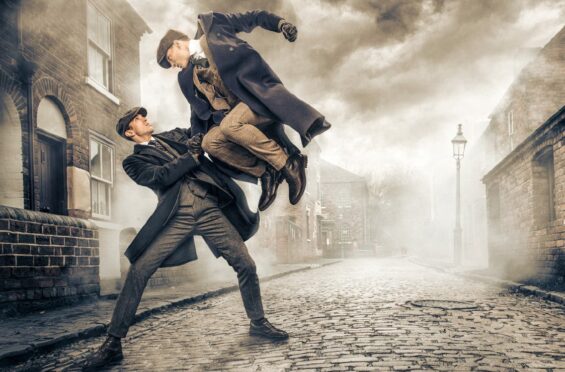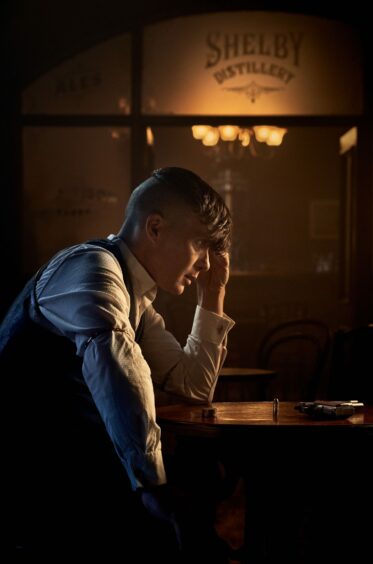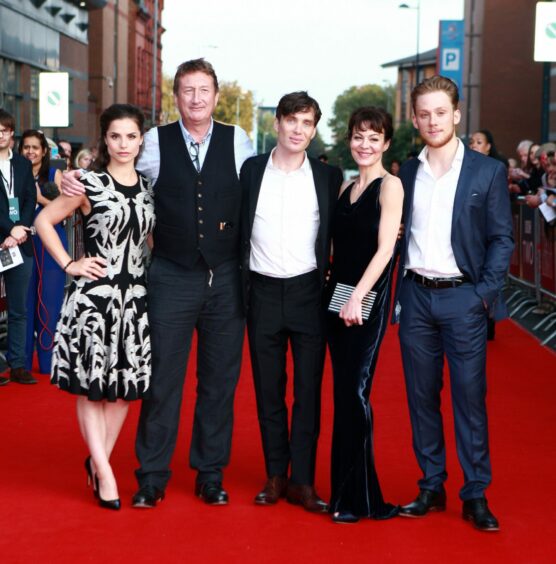
The stylised world of TV’s Peaky Blinders demands gravelly Brummie accents, flat caps concealing razor blades and, of course, a carefully-curated musical playlist.
For series creator Steven Knight, the swaggering sounds of Peaky – as he likes to call the hit BBC drama – has always been key to its appeal.
A new stage production of Peaky Blinders is taking the iconic tunes featured in the series and combining it with something that at first glance seems antithetical to the macho world of the Shelby clan as it rampaged through the worlds of crime and politics in the years before the Second World War.
Rambert presents Peaky Blinders: The Redemption Of Thomas Shelby, a dance theatre show written and adapted for the stage by Knight and directed and choreographed by Benoit Swan Pouffer. It recreates the atmosphere, swagger and even violence of the beloved series.
“That was the most amazing thing,” said Knight. “When I first saw the fight scenes I actually thought the dancers were going to hurt each other, because it looks so real. They brought in a film and television fight arranger to help with the choreography. It’s intense, especially if you’re near the front. You actually think: ‘oh my God, somebody’s gonna get hurt here. But the dancers do it with such expertise. It’s incredible.”
Knight came up with the idea for the production after watching a 12-minute performance by the Rambert dance company at a festival celebrating Peaky Blinders. He wrote a scene where the company, founded in 1926, perform Swan Lake for Tommy Shelby.
“I’m the furthest thing from being a dance person,” he said. “I just loved it. And the performance went down really well. The look and the swagger of Peaky Blinders actually lent itself to dance.
“So I wrote a scene in series, and that led to further conversations. I have no history in dance or anything but it just seemed to work. So I went for a meeting and I met Rambert’s artistic director Benoit Swan Pouffer. When we first sat down, they said: “So, when you write this ballet…”
“And I thought, ‘oh…’
“But that’s what I did, I just sat down and imagined I was in the auditorium, what would I want to watch? And I’ve described that and told the story of Tommy and Grace.”
Knight also recently wrote the BBC One adaptation of SAS: Rogue Heroes which, like Peaky Blinders, features music plucked from across the 20th Century: mostly classic rock and heavy metal.
The music may seem jarring at first, but Knight believes the songs fit the attitude of what’s happening on screen, and refers to Cillian Murphy, to the show’s soundtrack. “Cillian said, ‘A piece of music either is Peaky or it’s not, there’s no way of knowing why’. It can be folk, it can be heavy metal, it can be David Bowie or it can be Leonard Cohen,” said Knight.
“Using heavy metal in the Second World War may seem strange at first,” Knight said, “but I think that, even though music is determined by eras and genres, it is also sort of timeless.
“When you hear that heavy metal music, it is the sound of men going to war. The sound of metal and Black Sabbath was born in Birmingham, in the factories, and it was hard men doing hard work. To me that fitted with the SAS.
“With Peaky it’s a bit more nuanced in that. It can be almost any genre. Some songs just lend themselves to Peaky, and that link between Peaky and music was what made me think that this dance thing would work.”
Razor gangs having dance-offs might not seem authentic, but the visceral battles of real-life gangs has always intertwined with dance, said Knight. “There were gangs in Paris called the Apaches in the 1880s, 1890s,” he added. “And they used to dance and fight, and they used to have a form of fighting that was dancing. I spoke to Benoit about that – we looked at all of that.
“Humans have a war dance tradition, it’s one of the oldest traditions. Dance is an expression of all human emotions.”
Rambert’s Swan Pouffer added: “Peaky Blinders: The Redemption Of Thomas Shelby is something on a scale we’ve never done before, and I couldn’t be more ready for the challenge – it’s such an exciting opportunity. What you’re going to get as a result will be an inspiring and uplifting dance show, but so much more than a dance show.”
Peaky Blinders, since it arrived a decade ago, has created an industry: clothing, books, a forthcoming spin-off movie, even Peaky Blinders pubs around the world.
Even being asked if he wants a Peaky Blinders haircut at the barbers makes Knight proud of the legacy he’s created.
“The way it has entered the culture is the best form of reward for what you do,” he added. “Because it’s not just critics or anything, it’s actually people letting it into their lives. And, for me, it’s been fantastic.
“It’s not just Britain, it’s all over the world. There are Peaky bars in Buenos Aires, Rio, Moscow. I get people texting me photos saying: ‘Here’s a Peaky bar in Montevideo!’ “It’s just mad. I love it.”
Knight is set to shoot the forthcoming Peaky Blinders movie later this year in Birmingham, and there will also be a series of spin-off shows.
“They’ll maybe take the story to the 50s but it won’t be me writing those. As the 30s become the 40s and the 50s, I like the idea of throwing these characters into the real world and the real events that happened at the time.
“The way I see it, as long as there’s an appetite for the world of Peaky, then we should keep doing it. And there’s plenty more to say.”
Some blinding tunes
The show’s sixth and final season was, as ever, theme-tracked by Nick Cave’s Red Right Hand but the eclectic soundtrack also included: Anna Calvi, You’re Not Good; Joy Division, Disorder; Count Basie, Sixteen Men Swinging; Luciano Pavarotti, Nessun dorma!; Bambara, Miracle; Idles, Kill Them With Kindness; Thom Yorke, 5.17; Sinead O’Connor, In This Heart; Nick Cave and the Bad Seeds, Do You Love Me?; Gilla Band, Law Man; Marilyn Monroe, One Silver Dollar; Patti Smith, Red Right Hand; Mozart, Lacrimosa (The Requiem in D minor); and Lisa O’Neill, All the Tired Horses
Peaky Blinders: The Redemption Of Thomas Shelby is at the Festival Theatre, Edinburgh, February 28 to March 4

Enjoy the convenience of having The Sunday Post delivered as a digital ePaper straight to your smartphone, tablet or computer.
Subscribe for only £5.49 a month and enjoy all the benefits of the printed paper as a digital replica.
Subscribe © BBC/Caryn Mandabach Productions
© BBC/Caryn Mandabach Productions © Graham Stone/Shutterstock
© Graham Stone/Shutterstock